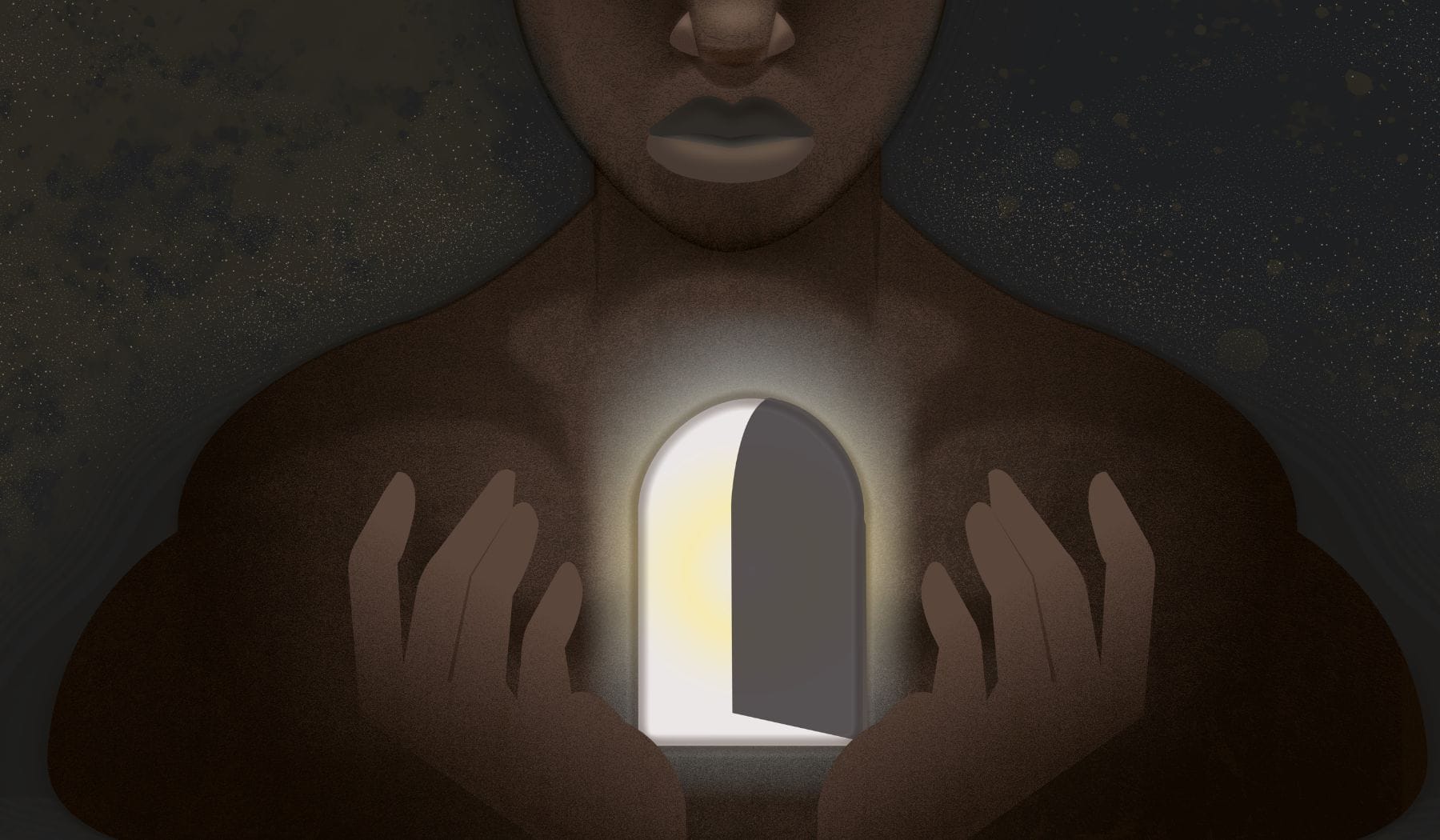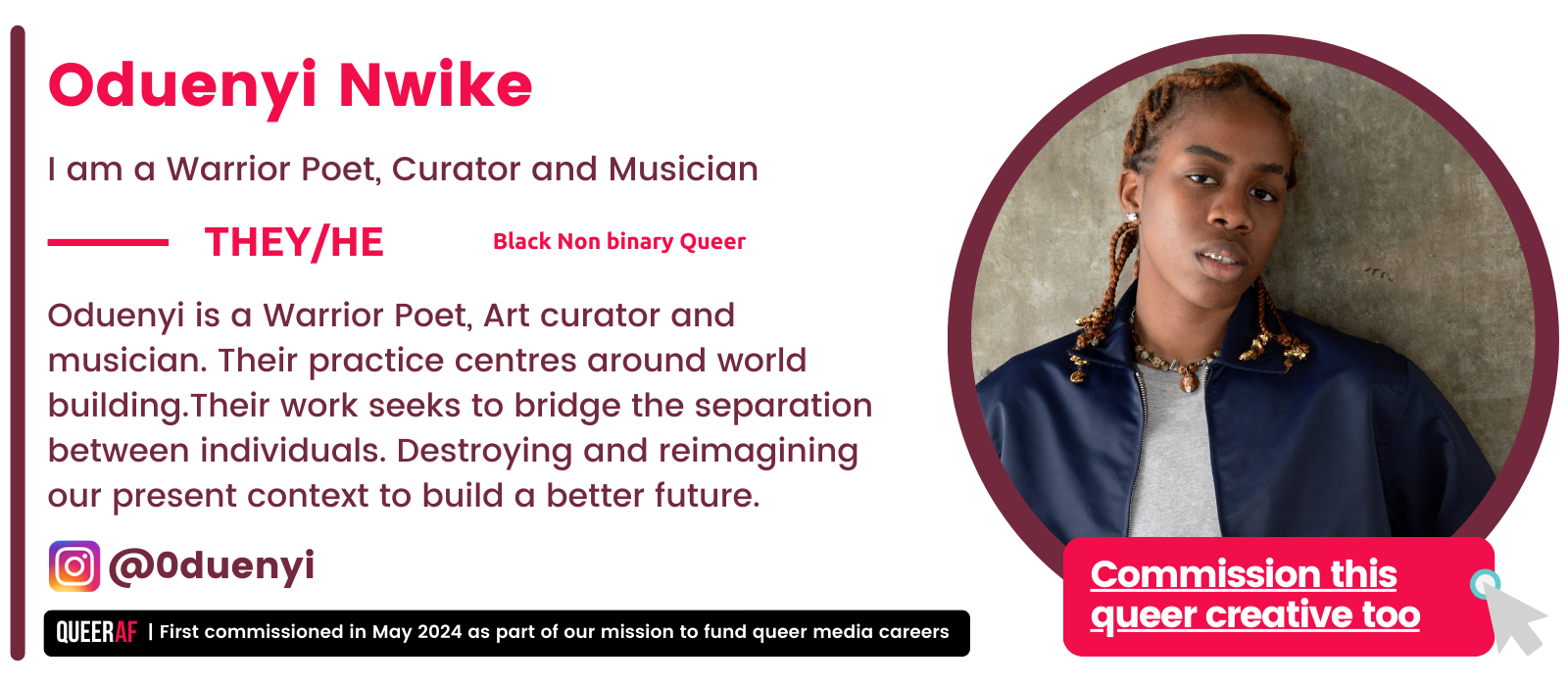
Trans+ History Week’s Transcending Words poetry event shows is the way we share, live and learn our history is different for all of us. For Oduenyi Nwike, learning about our history is “fundamental to validating our own realities as trans people”, because Trans+ people are not reflected in so much of the history and media we consume. It alienates the psyche and it can be difficult existing in a world with very few mirrors.
History, however, provides building blocks which we can use to support ourselves in our search of personhood. Just like the event tonight, for Oduenyi oral and lived history should serve as important elements in understanding trans history. And that’s why, as we celebrate and capture Trans+ poetry at the event, Oduenyi Nwike looks at their ancestral heritage in a poetic form.
This article was produced as official content for the first ever Trans+ History Week, one of QueerAF's launchpad projects.
I want to tell you a story. The words I want to say have not been created yet. I can only show it to you by how I dress, the way I flatten my chest. I'll give you an indication of what to call me.
I hold the remanence of my ancestral oral stories. These stories did not survive the voyage. They have been lost in translation; they have been lost at sea and crumbling in my hand. Colonialism coats my tongue like a white film.
My words get caught in it. Queer American, novelist, essayist and social critic, James Baldwin says, “The place in which I’ll fit will not exist until I make it”.
My heart is in Nigeria, where my existence is viewed as a Western import. My head is here, in Europe, a grey landscape.
It feeds me flags and trinkets shaped like freedom, but their symbols are filled with empty promises, and their motifs carry no meaning.
My trans body is nomadic, I orbit somewhere between the past and the future when my present isn't home for me.
Where do I go? I float within oblivion. Where do we exist?
I look around
There is wind in my eyes
The world before me
And I am gliding through
People walk slowly
Towards singularity
I walk to understand
I am just passing through
Life is coming and going...
I want to feel like
Keys
On
A
Piano
When
They
Trickle
Sound
I want to feel like
Sunrise and Sun fall
Existing on my own time.
I want to see the world
When it doesn’t know I'm looking
I want to know that I exist.
Queerness stretches further than a gender identity; it is the way one navigates.
We are queer, meaning we are constantly searching for home. We are looking for a place where we can take off our shoes and rest our heads.
Our non-conforming gender identities instinctually lead us on a path many people do not walk. Many could not. But we must and we can. The normative notions of a stable sense of home have proven to be a luxury many trans people do not experience in this lifetime.
The world we live in fails trans people, but the world has not always been like this. Within my culture, Igbo, one of the largest ethnic groups in Nigeria, I was never taught about our history of transness.
Mouths were sealed, time passed and history lay dormant.Yet in recent years I came to learn that my culture has many indigenous trans identities, quietly present there.
I learned of the documented tradition of women having “female husbands”. A woman would take on the titles and duties of a man, marrying a bride and raising a family. My eyes welled up with tears as I saw a representation I longed for my entire life.
Then I felt this anger about the injustice of it all, of colonialism. Many Nigerian people are violently transphobic because they have been conditioned into rejecting and demonising queer aspects of their culture. The erasure of African history is also the erasure of queer African history.
At times I find it more helpful to view history not as a universal timeline, but as an individual one. Each person has their own personal relationship with time. Some of the most valuable histories have been destroyed.
Some of the most valuable histories were never written down. They were spoken, and this art form is retained by human connection and community. Why do we not respect the sanctity of oral history?
The life it breathes into us as we use our voices to keep stories alive. We have created this unspoken hierarchy that values written history as scripture and oral history as hearsay.
Many countries outside of the Western world, have a rich history of preserving their stories through storytelling, from generation to generation. Transphobic and anti-human governments understand this.
They remove Trans stories from libraries, from education, from schools. They erase and rewrite history repeatedly, but we hang in there, in between the margins and the stories they slick over with white paint.
We are there. We are here. We are everywhere...

🎨 Artwork description, by David Kwesi Ferebee
"In this illustration, I've captured the essence of a profound journey of homecoming for Black transgender individuals. At the center of the piece stands an illuminated door, its warm light beckoning with a promise of acceptance and understanding.
"Drawing inspiration from the resilience of Black transgender individuals, I've incorporated elements that resonate deeply with our experience. Just as in Igbo culture, where inner strength is revered, the illuminated door symbolizes the inner resilience and courage of Black trans individuals as we navigate our identity and seek belonging.
"The warm glow emanating from the door represents the inner light and authenticity that guides the journey of self-discovery, illuminating even the darkest corners of doubt and fear. It serves as a beacon of hope and resilience for Black transgender individuals as we reclaim our sense of home within themselves.
"Through this illustration, I aim to honour the lived experiences and celebrate the strength and resilience of Black transgender individuals while acknowledging the ongoing journey towards self-acceptance and empowerment."
When I view myself in Tandem
With the Time
Then, Self-love becomes less of an act
But a service
If I am a collection of stories
Of strengths and weaknesses
Of minds and genders...
Then loving myself is no longer pressure full
It is loving all my relatives I never got to meet.
Loving each soul that passed before me
Loving their bodies
Their bones
Their minds
The stress I inherited that I will make right
Their stories I will honour!
Through loving myself
Yes! Loving myself as a selfless act!
As an act of not rebellion,
But preservation.
Everything I inevitably came to understand
My mind
My body
My soul
This body will always be my home
If I am an amalgamation of ancestors
I believe I can never truly be alone.
We do not need to prove we have a right to exist, we simply have been and always will be.
We live in a world that attempts to use the legal system to legislate reality. A reality where trans people are a concept not to be shown or spoken of.
One where we are everything they are too afraid to understand. They’d rather write us out of the story of humanity.
What can we learn from this history?
We must use our autonomy where we can to write our own narratives, although we cannot enforce them with the brutish force of the law. We can plead with the quietness of the spirit, with the expansivity of language.
Being trans is one of the most human things you can do.
We intuitively follow a feeling we have about how we should exist in this world, even when it conflicts with what has been placed on us.
Trans people create a beauty within the conflict society has with our identity.
When we stop speaking, we stop existing. Histories are forgotten and people are erased. We must write our own stories, continue our oral traditions, and create new ones so stories are not lost at sea. I encourage you to speak.












